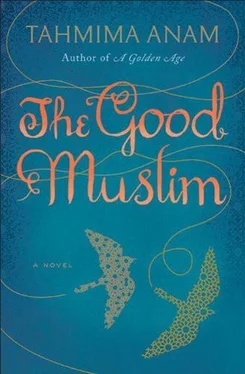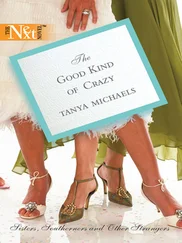*
There was a pile of boxes in the tin-topped garden shed, sheeted with dust and cobwebs. Rifling through it, Maya found her school report from Class VI. Mediocre marks, and a note from the teacher complaining that she talked too much and frequently interrupted the lesson.
A short shadow in the open doorway: Zaid.
‘Well, there you are. I called for you yesterday — where were you?’
‘At school.’
‘Really, you went to school? What did they teach you?’
‘French.’
‘French? What a very nice school. Are you sure it wasn’t one of the women upstairs?’
‘No,’ he shook his head; ‘it was a proper school.’
‘And you wore pant-shirt?’
He was holding something behind his back, and he produced it now, a package wrapped in brown paper. ‘For you,’ he said.
Maya tore it open. It was a brand-new Ludo board, with coloured pieces and a pair of dice. ‘For me?’ she asked. ‘Where did you get this?’
‘Mare-see,’ Zaid said. ‘That’s thank you in French.’
Maya repeated the word. ‘Thank you.’ She passed the board back to Zaid. ‘Why don’t you hold on to it, and when you want to play you can bring it downstairs?’
‘Now we can play with Dadu,’ he said, smiling, and slipped out of the doorway, the Ludo board balanced on his head, returning the light to the shed. Maya continued her reconnaissance, sifting through old newspapers, cans of paint, a bag of leftover cement, until she found what she was looking for: a stolen cinema projector, still packed in its case, the hinges crimson with rust.
*
On Friday, Joy came to collect Maya for the party. He knocked on the door, smiling and smelling of soap. Ammoo greeted him warmly as he bent down to touch her feet, interrupting Dallas to inquire after his mother. His car smelled of leather and aftershave. He rolled down the window and stuck his elbow out, his other hand light on the steering wheel. ‘So why did you move to the village anyway?’ he said, as they made their way across town to Gulshan.
Maya shifted in her seat. She had decided to wear a simple cotton sari, and now, with the warm air whipping around Joy’s car, her pleats already creased, she began to regret it. She should have listened to her mother and dressed up a little, maybe worn a silk or a chiffon. ‘Things were changing too quickly,’ she said. ‘I couldn’t stand it any more.’ It sounded so harsh when she put it that way.
‘And you gave up your training, everything?’
‘I was a year away from finishing. I completed the internship at Rajshahi Medical. Then I just became a simple country doctor. But that’s what people need out there, someone to help them deliver babies.’ She felt the urge to tell him more, to explain about the abortions she had done after the war, and that she hadn’t realised until later, much later, that she had racked up a debt she was still struggling to repay. How could he know — he was just a soldier, he had killed as a matter of principle, but the war babies, the children of rape, had been left to junior doctors, the volunteers in ragged tents on the outskirts of town.
They were on Road 27 now, passing Abahani Field. Maya remembered playing cricket with Sohail on that field, running between the wickets in her salwaar-kameez.
‘Seven years, you’ve been in Rajshahi?’
‘I went to Tangail first, but it wasn’t far enough.’ They sped through a wide road with a fountain at one end, an abstract sculpture at the other. She wanted to change the subject. ‘So, what’s new in Dhaka?’
‘I haven’t been here that long myself. Looks different, doesn’t it?’
‘Hmm.’
‘They changed the road numbers — you must already know that.’
She did. Dhanmondi had been renumbered. No one knew whether to refer to their street by the old number or the new. Old 13, they said, new 6A. It was like a half-swallowed pill, stuck in the throat. Perhaps they were hoping the old places would not be what they had once been to people, the streets where they had marched and the streets to which they had taken to cast their votes. Road 27 was no longer the artery through which the army had driven its tanks. And Road 32 was no longer where Mujib had been killed, falling upside down on the staircase of his house, his pipe clattering to the chequered ground, the flower of blood pooling and colouring his hair. No, you could no longer say, it happened at Bottrish Nombor; you would have to say it was Road 26A, a new road on which no man had been killed, no man and his wife, sons, daughters-in-law, brother, nephew, bodyguards, drivers, gatekeepers. And 26A was not the kind of number you could assign to those deaths, attached, as it was, to an English letter. Yes, she knew they had changed the numbers.
They spent the rest of the journey in silence, Maya’s eyes following the road as they passed the old airport, the cantonment, Mohakhali with its new office buildings and factories. Finally they turned into Gulshan, where the plots of land were twice as large and the cars were thick on the streets, where even the Dictator had a light touch.
Chottu’s cheeks were shiny and pink. ‘Yalla, I’m seeing a ghost!’ He clapped an arm around Joy. ‘Where did you find her?’
‘Shaheed Minar,’ Joy said. ‘We were lighting candles.’
Chottu erupted into a growling, used-car laugh. ‘Always looking for trouble, dost. Come, Maya, come inside. Saima will crucify me if I keep you to myself.’ He led them through the house, through the garden, which had been decorated with fairy lights, and into a large yellow marquee.
A woman in a blue chiffon sari handed Chottu a drink. ‘People, this is Maya, my old muktijuddo friend.’ He gestured to the crowd with his glass. A few people turned around and waved. ‘What will you have, Maya? Coke? A little veeno?’ He lowered his voice. ‘ Whisky? Paul will get you anything you like.’ A man appeared beside Chottu. He wore a suit and a pair of white gloves.
‘Juice?’ Maya said.
Chottu shook his head, disappointed, and motioned to Joy. Joy looked at Maya, cleared his throat. ‘Juice for me too, thanks.’
‘Bastard,’ Chottu said. ‘Making me look bad.’
‘Pineapple, Mango, Tomato, Tang,’ the waiter said. Maya heard a screech and turned around to find Saima careening towards her, a fat toddler in her arms.
‘I’ll kill you, I’ll kill you right now, you’re back in town, you didn’t call me? Ei, Joy, you didn’t tell me you were bringing her, thought you’d make it a surprise, you bad boy, OHMYGOD, I don’t believe it.’ She passed the child to the waiter and cupped Maya’s face in her hands. ‘Let me see you properly. Alhamdulillah, you haven’t aged a day, you cruel, cruel woman. Look at me, I’m a shrivelled old hag next to you.’
Maya shook her head and returned the compliment, taking in the shiny sari Saima was wearing, and the carefully orchestrated strands of hair that fringed her face. People were staring now. Saima took Maya’s hand and began to introduce her to the other guests. The Blue Chiffon woman was called Lovely. Her husband, Pintu, was a tiny, sweating man in a white T-shirt. ‘This is Khaled and Minny, they live opposite, and Khaled’s brother, Sobhan, and his wife, Dora. Dora bakes the most delicious cakes, chocolate, vanilla, lemon — the lemon is divine.’ Dora threaded her arm through her husband’s and gave Maya a watery smile. Maya wondered what had happened to their old friends, the slightly shabbier-looking ones with whom they had gone to school and run away to war. Pot calling the kettle, she told herself; you haven’t kept up the old ties either. Saima’s hand was soft and damp as she led Maya from guest to guest. She smiled and smiled, smearing a bit of lipstick on her front tooth. ‘I want to hear everything,’ she said, ‘and I mean ev-ree-thing. Let me check on the food first, I’ll be back. They’ll make a mess of it if I don’t supervise.’
Читать дальше












